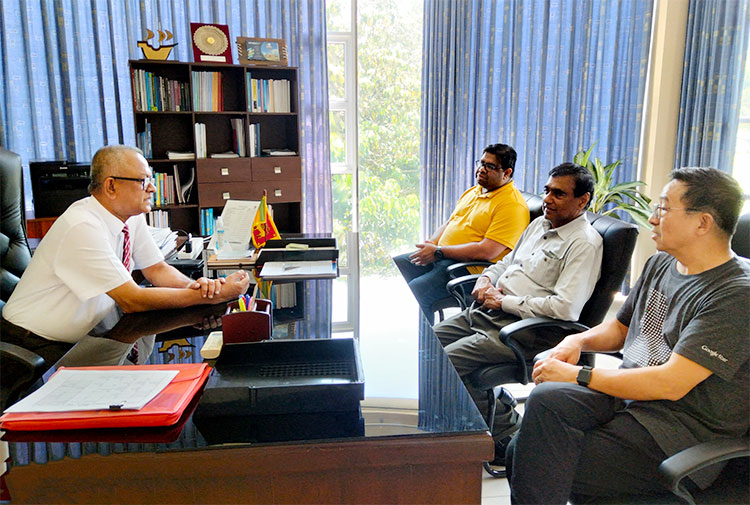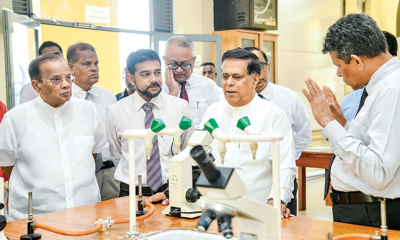News
SL joins American Georgia State University’s global Cosmic Ray Muon Detector network

Sri Lanka became the very first country (outside the USA) to deploy Georgia State University’s (GSU) Cosmic Ray Muon Detector. Sri Lanka now becomes GSU’s first international member as a part of its ongoing deployment plan for a global muon detector network and hosts a detector each at two strategic locations – Badulla, hosted at the University of Uva Wellassa campus, and Colombo, hosted at the University of Colombo campus, according to a press release issued by Prof. Unil Perera of GSU.
These two detectors have started logging data since end of March, and the data is being shared between the campuses and communicated to a central repository, managed by the GSU team in Atlanta, Georgia. The data from the detectors consists of raw muon counts (flux) sampled at one-minute intervals, which will be comprehended with meteorological data from open data sources and meteorology department collaborations. These datasets, along with the datasets generated by the entire network of muon detectors that have been deployed and those that will be deployed in near and far future, will be made available for free access to promote climate and other inter-disciplinary research across the globe.
Cosmic rays are high energy particles moving through space at nearly the speed of light and are one of the few direct samples of matter from outside our solar system. Most cosmic rays are protons (i.e., ionized hydrogen nuclei) with galactic origins. Other cosmic ray particles include gamma rays, electrons, neutrinos, and heavier elements. Protons could be deflected by magnetic fields making it hard to determine their origin.
Discovered in 1912, many things about cosmic rays remain a mystery more than a century later. Cosmic ray radiation has been blamed for causing electronics problems in satellites and other machinery. Earth’s magnetic field and atmosphere shield the planet from 99.9 percent of the radiation from space. However, for people outside the protection of Earth’s magnetic field, space radiation becomes a serious hazard. A previous Mars rover mission during its 253-day cruise revealed that the radiation dose received by an astronaut on even the shortest Earth-Mars round trip is equivalent to receiving a whole-body CT scan every five or six days.
This cosmic ray detector network deployment in Sri Lanka was spearheaded by GSU and led by computer scientist and engineer Dr. Ashwin Ashok (Associate Professor, Computer Scientist), nuclear/particle physicist Dr. Xiaochun He (Regents’ Professor, Physics and Astronomy), and device and biomedical physicist A. G. Unil Perera (Regents’ Professor, Physics and Astronomy). The team visited Sri Lanka to set up two cosmic ray muon detectors at the Faculty of Applied Sciences, Uva Wellassa University (UWU) in Badulla, and the Department of Physics at the Faculty of Science at the University of Colombo (UOC). Professor Jagath Pitawala and Dr. Rasanga Samaraweera (a former GSU graduate) will lead the project at UWU. Prof. Upul Sonnadara, Dr. Kithsiri Jayananda, and Mr. Deshitha Wickramarathna will be the lead team working at UOC on the project. The cost of the detectors, associated electronics and travel costs were borne by GSU, with an agreed official memorandum of understanding (MoU) and a material transfer agreement (MTA). The participants (including the researchers) will have access to the worldwide data and will be equal partners of the network of scientists studying the effects of the variation of muon flux with exogenous parameters such as elevation, time of the year and ambient temperature and pressure.
At present GSU has five cosmic ray detectors installed in the USA, three in Atlanta at the GSU main campus, another at Mount Wilson, California (GSU Chara Array cite) and at the Hard Labor Creek Park Observatory, (another GSU observatory in Rutledge, GA). In addition to the two detectors in Sri Lanka, the next stage of international installations is planned for a subset of countries in Asia and Europe. The main goal of the project at the near-term is to install more detectors at collaborating institutions worldwide and to study the variations of cosmic ray muon flux which are associated with the regional weather patterns and with the changes in space weather. The long-term goal is to install detector(s) in every country in the world and to use the network for several interdisciplinary studies which include space and terrestrial weather monitoring, public health (related to cosmic ray radiation), and other practical applications based on cosmic ray particle studies.
GSU is a “research one-R1” public University in the USA (recognized as one of the most research-intensive institutions by the Carnegie Classifications with at least 20 research or scholarship-based doctoral degrees and spend at least $5 million on research each year) and the nation’s second most innovative university in the US (US News and World Report) with more than 250 different majors and 35 different PhD programmes, has a fruitful connection with Sri Lanka. GSU has graduated more than 30 Sri Lankan students with Physics doctorates in addition to several doctorates in Computer Science, Biology, Chemistry, etc. Several of those GSU doctorates, particularly from Physics, are working as productive faculty members at several Sri Lankan universities and other reputed research laboratories around the globe.
Professor Unil Perera, a UOC alumni, who was also the graduate Director of Physics at GSU from 1995-2012, had established several joint programmes GSU, IIT Chennai and IFS, Hanthana and with UOC. GSU proudly and cordially welcomes this research collaboration and hopes to pursue these ties for a long term and further the cordial USA-Sri Lanka relationship.
News
US sports envoys to Lanka to champion youth development

The U.S. Embassy in Colombo welcomed the U.S. Sports Envoys to Sri Lanka, former National Basketball Association (NBA) and Women’s National Basketball Association (WNBA) players Stephen Howard and Astou Ndiaye, from June 8 through 14.
The Public Diplomacy section of the U.S. Embassy said that it would launch a weeklong basketball program intended to harness the unifying power of sports, made possible through collaboration with Foundation of Goodness and IImpact Hoop Lab.
While in Sri Lanka, Howard and Ndiaye, both retired professional basketball players, will conduct a weeklong program, Hoops for Hope: Bridging Borders through Basketball. The Sports Envoys will lead basketball clinics and exhibition matches and engage in leadership sessions in Colombo and Southern Province for youth aged 14-18 from Northern, Uva, Eastern and Western Provinces, offering skills and leadership training both on and off the court. The U.S. Envoys will also share their expertise with the Sri Lanka Basketball Federation, national coaches, and players, furthering the development of basketball in the country. Beyond the clinics, they will collaborate with Sri Lankan schoolchildren to take part in a community service project in the Colombo area.
“We are so proud to welcome Stephen and Astou as our Sports Envoys to Sri Lanka, to build on the strong people-to-people connections between the United States and Sri Lanka,” said U.S. Ambassador Julie Chung. “The lessons that will be shared by our Sports Envoys – communication, teamwork, resilience, inclusion, and conflict resolution – are essential for leadership development, community building, equality, and peace. The U.S. Sports Envoy program is a testament to our belief that sports can be a powerful tool in promoting peace and unity.”
News
Rahuman questions sudden cancellation of leave of CEB employees

SJB Colombo District MP Mujibur Rahuman in parliament demanded to know from the government the reasons for CEB suspending the leave of all its employees until further notice from Thursday.
MP Rahuman said that the CEB has got an acting General Manager anew and the latter yesterday morning issued a circular suspending leave of all CEB employees with immediate effect until further notice.
“We demand that Minister Kanchana Wijesekera should explain this to the House. This circular was issued while this debate on the new Electricity Amendment Bill was pending. There are many who oppose this Bill. The Minister must tell parliament the reason for the urge to cancel the leave of CEB employees,” the MP said.However, Speaker Mahinda Yapa Abeywardena prevented Minister Wijesekera responding to the query and said that the matter raised by MP Rahuman was not relevant.
News
CIPM successfully concludes 8th Annual Symposium

The Chartered Institute of Personnel Management (CIPM) successfully concluded the 8th Annual CIPM Symposium, which took place on 31st May 2024. Themed “Nurturing the Human Element—Redefining HRM in a Rapidly Changing World,” the symposium underscored the pivotal role of human resource management (HRM) in today’s dynamic global landscape. Since its inception in 1959, CIPM has been dedicated to advancing the HR profession through education, professional development, and advocacy, solidifying its position as Sri Lanka’s leading professional body for HRM.
Ken Vijayakumar, the President of the CIPM, graced the occasion as the chief guest. The symposium commenced with the welcome address by the Chairperson, Prof. Arosha Adikaram, followed by the Web Launch of the Symposium Proceedings and Abstract Book by the CIPM President. The event featured distinguished addresses, including a speech by Chief Guest Ken Vijayakumar, President of CIPM, and an address by Guest of Honor Shakthi Ranatunga, Chief Operating Officer of MAS Holdings Pvt. Ltd., Sri Lanka.
The symposium also featured an inspiring keynote address by Prof. Mario Fernando, Professor of Management and Director of the Centre for Cross Cultural Management (CCCM) at the University of Wollongong, Australia.
Vote of Thanks of the inauguration session was delivered by Dr. Dillanjani Weeratunga, Symposium Co-chair.
The symposium served as a comprehensive platform for researchers to present their findings across a wide range of critical topics in HRM. These included Cultural Diversity and Inclusion, Talent Development and Retention, Ethical Leadership and Corporate Social Responsibility, Adapting to Technological Advancements, Mental Health and Well-being at Work, Global Workforce Challenges, Employee Empowerment, and Reskilling and Upskilling.
The plenary session was led by Prof. Wasantha Rajapakse. Certificates were awarded to the best paper presenters during the valedictory session, followed by a vote of thanks delivered by Kamani Perera, Manager of Research and Development.
The annual symposium of CIPM was a truly inclusive event, attracting a diverse audience that spanned undergraduates, graduates, working professionals, research scholars and lecturers. This widespread interest highlights the symposium’s significance in the field of HRM, offering a unique opportunity for everyone to network and learn from scholarly brains.The CIPM International Research Symposium was sponsored by Hambantota International Port, Sri Lanka Institute of Information Technology (SLIIT), E B Creasy & Co. PLC, and Print Xcel Company.














